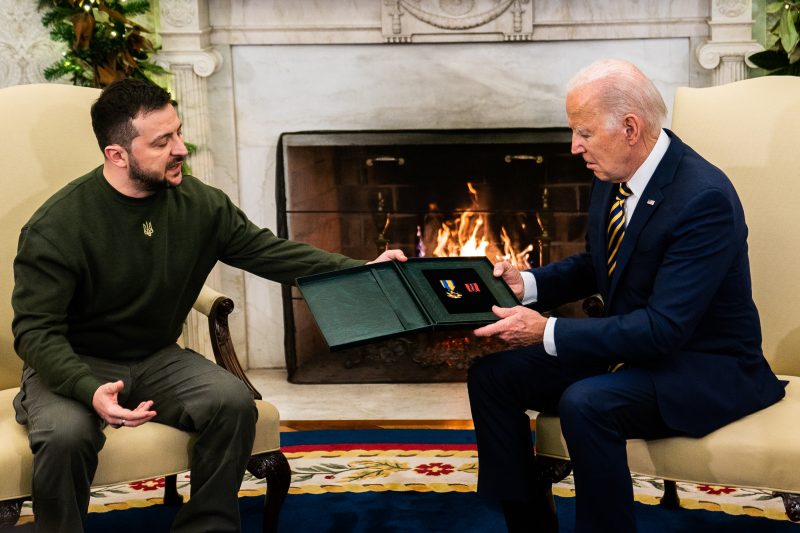
Dog bowls from Johnson, a $12,000 desk set from Putin: The gifts foreign leaders gave Biden
In June 2021, Russian President Vladimir Putin met with President Biden in person at a historic first summit in Geneva. Relations between the United States and Russia were already considered to be at a low at the time: The two leaders had an array of weighty issues to discuss, among them accusations of Moscow interfering with U.S. elections, alleged human rights abuses and a lengthy list of security demands from Putin.
Still, it would have been rude to show up empty-handed.
The tensions didn’t prevent Biden and Putin from following the longtime diplomatic tradition of exchanging gifts. In Geneva, Biden gifted Putin a pair of his trademark aviator sunglasses and a crystal sculpture of an American bison, the national mammal of the United States. And Putin gave Biden a miniature Kholui lacquer writing set, valued at $12,000, according to a report published Thursday by the State Department’s Office of the Chief of Protocol.
Putin’s gift was by far the most expensive Biden received from a foreign government or head of state in 2021, according to the report. But the price in this case would have no correlation to strength of their actual relationship. Eight months later, Russia would invade Ukraine, launching the first land war in Europe since World War II. Biden has since repeatedly cast Putin as a threat to democracy and the global order, while Putin has accused Biden of helping rally the international community against Russia.
As for the $12,000 writing set? It has since been transferred to the National Archives and Records Administration.
The State Department’s annual report provides a fascinating glimpse into the practice of gift-giving in diplomatic settings. All federal employees are required by law to report gifts from foreign government sources valued at $415 or more, though certain officials — the president, first lady Jill Biden, Vice President Harris and Secretary of State Antony Blinken — were the most frequent recipients of foreign gifts, given their positions.
Gifts of state are meant to be “enduring emblems of international cooperation and friendship,” according to the National Archives, one of the federal agencies responsible for keeping presidential gifts. “All enrich the relations between two countries and their leaders. And each recalls a moment in history, when two nations — often separated by oceans or ideology — briefly clasped hands.”
They also can reveal plenty about the giver. In a show of regal confidence, Queen Elizabeth II gave Biden a silver-framed photograph of herself (estimated value: $2,200) in June 2021. Later that same month, then-British Prime Minister Boris Johnson gave Biden a pair of dog bowls, presumably for Biden’s two German shepherds, along with some wool blankets, mugs and a fountain pen set.
That summer, Mohammed Ashraf Ghani, then-president of Afghanistan, gave Biden a silk carpet worth $9,600, while his wife gave Jill Biden another silk carpet worth $19,200. Within weeks, Ghani would flee the country after the Taliban overtook Kabul following the withdrawal of U.S. troops from Afghanistan.
In September 2021, Ukrainian President Volodymyr Zelensky gave Biden a U.S. flag, whose estimated value of $700 paled in comparison to that of the writing set Putin had gifted Biden a few months before. One year later, Zelensky — now presiding over a country at war — would return to Washington, presenting Biden with a medal on behalf of a Ukrainian military commander who had asked him to give it to “a very brave president.” A visibly moved Biden said it was “undeserved, but much appreciated.”
In modern times, a president might receive 15,000 gifts a year, according to the National Archives. However extravagant or impractical — how many fountain pens and goblets and silk carpets can one official have? — the gifts from foreign governments are almost always accepted because, in the words of the State Department report: “Non-acceptance would cause embarrassment to donor and U.S. Government.”
Most gifts end up transferred to the National Archives or to the General Services Administration, unless the recipient pays fair market value to keep the gift. Some are officially displayed. A few of the gifts listed in the 2021 report were “destroyed.”
However, some gifts remain unaccounted for. The State Department’s records for state gifts in 2020 show nothing listed for former president Donald Trump, who was still in office that year, because his administration did not submit proper reporting of any gifts he received. Last year, congressional investigators said they were searching for dozens of pricey mementos gifted to Trump and his family members by foreign governments, as The Washington Post’s Jacqueline Alemany and Josh Dawsey reported then:
Former Secretary of State Colin Powell once told The Washington Post that it was important to “never show any sign of disfavor” when receiving a gift from a foreign government, no matter how bizarre.
“Thank you, my dear friend,” he suggested as a universally acceptable response then. “This will bind us, and our two countries even more closely.”
